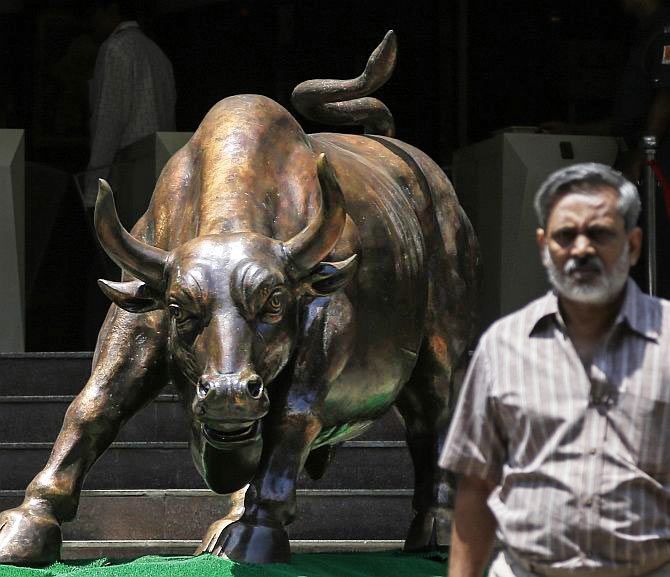
Risk-off sentiment to make a comeback, impacting foreign money flows into emerging markets like India
Market experts expect increased volatility this week on account of the aftermath of Brexit.
The move to safe haven assets from riskier assets is likely to continue.
The derivatives expiry on Thursday is also expected to add to the volatility.
Analysts led by Abhay Laijawala, MD and head, research, Deutsche Equities India, in a note on Friday, said, “A heightened level of financial market volatility and uncertainty over the outlook for currencies and global macro will undermine equity markets -- including India.”
Analysts at Citi Research had similar views.
Surendra Goyal and Vijit Jain of Citi Research expect near-term volatility to stay and said, “Given the event (Brexit) and likely risk-off trade, we see a near /medium-term impact due to multiple factors.”
The Citi report lists possible demand impact, currency, commodities and flows as the factors.
It added there could be possible demand impact on IT (information technology) services, some auto ancillary/pharma companies.
On currency, Citi said there are multiple moving parts given the moves in major currencies and the impact on forex debt needs to be watched out for.
In commodities, it said, the downward direction should play in favour.
On flows, Citi said, "India is an overweight market in the emerging market space and that can always create near-term volatility."
On Friday, NSE’s India Vix, which measures volatility, closed at 18.63 after an intra-day high of 21.05.
Compared with past events that have impacted the markets, Friday’s volatility index is not a worrying number.
However, the expiry of the June derivative series this week will weigh on markets too.
Derivatives experts believe the markets might remain shaky till the Nifty, benchmark index on the National Stock Exchange, reclaims 8,150.
Technical analysts say the Nifty might retest recent lows of 7,980-7,960, then 7,927.
“The Nifty made a Doji candle on the weekly chart, meaning the bulls and bears are fighting to get a grip.
"A Doji candle after a strong rally usually indicates a trend reversal,” said Chandan Taparia, derivatives analyst, Anand Rathi Financial Services.
He said the market was ruling out the possibility of a reversal, as the index had been making a higher top-higher bottom formation.
Others like Deepak Jasani, head of retail research at HDFC Securities expect the market to trend lower in the current week.
Jasani believes that the after-effects of Brexit might be felt for a couple more days, and a break from Friday’s low will lead to a faster down-move from here.
Some experts, however, also believe most of the damage that had to be done due to Brexit has happened.
And, even if foreign institutional investors sell shares next week, domestic institutional investors are likely to buy, to curb the volatility.
“Going by how the FTSE (in London) recovered on Friday, my sense is that volatility might abate in a day or two.
"One must remember this is not a financial crisis a la Lehman Brothers.
"And, all central banks are ready to act in a coordinated fashion, to ensure there is no threat to global financial stability. From that perspective, volatility is likely to be contained,” said Ajay Bodke, head of portfolio management services at brokerage Prabhudas Lilladher.
The jury is out on how markets will behave in the short-term, but there are worries over the medium term as well.
In the medium to long term, bouts of volatility are likely to persist, say experts.
Particularly if more European nations opt for an exit referendum, leading foreign investors to reassess and reshuffle their portfolios.
“Risk will again become a bad word and overseas investors will take money off risky assets, leading to some outflows from emerging markets such as India,” said UR Bhat, managing director, Dalton Capital Advisors (India).
“Historically, these kind of global events have impacted Indian markets disproportionately, given the excessive dependence on FII flows,” said Navneet Munot, chief investment officer, SBI Mutual Fund.
However, he noted, with steady flows from domestic investors and improved macro fundamentals, India’s ability to weather these storms is relatively better.
FIIs shopped for equities worth Rs 18,355 crore (Rs 183.55 billion) in the year to date, while DIIs bought equities worth Rs 11,354 crore (Rs 113.54 billion).
In 2015, buying was dominated by DIIs, which bought shares worth nearly Rs 65,000 crore (Rs 650 billion), while FIIs purchased Rs 18,355 crore (Rs 183.55 billion) of shares.
While the Indian markets might continue to face headwinds, they should benefit from positive cues such as the prospects of a good monsoon, consumption push from the Seventh Pay Commission, government reforms and improvement in earnings growth. Consequently, brokers are advising clients to keep calm and use corrections to buy.
“We are advising investors to sit on the sidelines for the next two days and let the markets settle down a bit.
"Post that, it would be a good time to start buying beaten-down quality stocks at dips,” said Prasanth Prabhakaran, head, retail broking, IIFL.
According to Jayant Manglik, president, retail distribution, Religare Securities, this is a good opportunity for investors to add quality stocks to their portfolio.
“If we put together the immediate negatives from global markets and recent domestic developments, we’re in a better position to absorb this setback and rebound quickly,” he said.
There is also a word of caution, that India is not insulated from global events.
“While there might be domestic positives, global cues will hold sway.
"One must not forget that India needs foreign capital to accelerate its growth momentum,” said Bhat.












 © 2025
© 2025